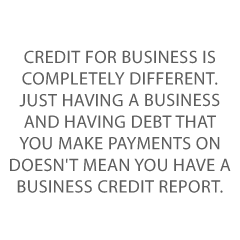Building credit for business purposes can seem like an unbreakable barrier. You need to get accounts reporting on-time payments to at least one credit reporting agency to build a strong business credit score. Yet, credit providers want to see a strong business credit score before they will approve you for a credit account.
If you know the secret formula you can hack the cycle, skip over a ton of wasted time and energy, and jump straight to the business of building credit for your business.
Here are 5 ways I hacked my way to building business credit.
Hack #1: I Set Up a Fundable™ Foundation
A business credit report and a personal credit report are different in a number of ways. One of the biggest differences is that your personal credit builds passively. You can bet with your first credit account, that account is reporting your payment history to your credit report. It’s just there, and it builds passively.
Reporting Credit for Business Is Different
Credit for business is completely different. Just having a business and having debt that you make payments on doesn’t mean you have a business credit report. Where are those payments reported? Well, if they are reported at all, it’s likely on your consumer credit.
Before a credit provider will report to your business credit report, you have to set up your company properly.
Building a Fundable Foundation
This began with making sure the business had its own contact information, separate from my personal information. Next, I got an EIN for free from the IRS. The next step was to incorporate. Operating as a sole proprietor or partnership doesn’t offer the separation you need for Fundability™.
After that, I opened a separate bank account for my business and got a D-U-N-S from Dun & Bradstreet. Then I hired a professional to ensure my website was awesome, and made sure my business email had the same URL as the website.
Hack #2: I Took Charge of My Personal Credit Score to Help Build My Business Credit Score
I got my free copy of my consumer credit reports from the business credit reporting agencies. I needed to be sure my consumer credit scores weren’t being dragged down by poor payment history or any other negative entries.
Also, remember that there are a lot of things that can affect your personal credit score. Business credit scores, once established, are pretty much only affected by payment history. The more on-time payments reported to the business credit reporting agencies, the better your score gets.
In contrast, personal credit is affected by:
- Hard inquiries
- How much credit you are using versus how much you have available to use
- Average age of credit accounts
- Even the account mix, or how many different types of accounts you have
This is all in addition to payment history. Why is personal credit important if credit for business is separate? First, most traditional lenders will check both scores. But also, at least two business credit bureaus, FICO SBSS and Experian, use personal credit in their formula for calculating business credit score.
Both Types of Credit Score Are Important
As a result, it is just as important to your business credit file as it is to your consumer credit file to keep your personal score strong. First and foremost, make those payments consistently on time. But also, watch how much available credit you are using at one time. Don’t keep balances too close to limits.
Then, try to have a good mix. All credit cards or all auto loans can have a negative impact. A mortgage, an auto loan, a couple of credit cards and maybe a HELOC could be a good mix.
And remember, every time you open a new account, you get a hard inquiry and the average age of accounts goes down. That doesn’t mean never opening anything new, but definitely be mindful of the impact.
Hack #3: I Checked My Business Credit Reports
First I had to be sure I even had one. Then, I knew that even without much of a payment history, my business credit reports could potentially show a low PAYDEX score or Financial Stress score. I wanted to be sure my Dun & Bradstreet credit reports were correct and complete.
Also, I wanted to see if my Equifax business credit scores were right, and my Experian business credit score was correctly reflecting my company’s credit history. I figured I could deal with the other credit reporting agencies later. First, I needed to see what my credit history looked like at that moment.
Monitoring Business Credit
Business credit reporting is a different animal altogether. You do not get free business credit reports from a business credit reporting agency. You can pay individual credit bureaus, but it can be pricey. Credit suite offers a monitoring package for a fraction of what you would pay with an individual business credit reporting agency.
It allows you to keep up with your business credit score from the top three business credit bureaus. Those are Dun & Bradstreet, Experian, and Equifax. You should be able to see your PAYDEX from Dun & Bradstreet, and any other score these three offer, such as your business credit risk score and your business failure score.
What To Look For
At the first look, scan for anything that could be blocking you. Any inconsistent or inaccurate information can cause a problem. Then, note how many accounts you have reporting so you know where you stand.
It’s important to note there are other business credit bureaus, but the only other one that is used with any regularity is FICO SBSS.
Other Important Agencies
There are other agencies that collect information that can affect your credit for business. For example, the Small Business Finance Exchange and LexisNexis both have information relating to public records and even insurance. Though they do not issue credit reports directly, business credit bureaus have access to this information. If it’s out there, they know, and it can make a difference in funding approval.
You can’t really do anything about the information they have. But start now ensuring they get only positive data. That will help counteract any old negative information.
Hack #4: I Got Accounts Which I Knew Would Report to One or More Credit Bureau for Business
Getting vendor accounts and business credit cards that report to one or more business credit bureaus is a proven way to build business credit. Still, it is easier said than done. Most vendors and credit cards do not advertise that they report to a business credit bureau.
How to Find Accounts that Report
Credit Suite keeps a database of fully vetted vendors that they know report. This includes which credit reporting agency or agencies they report to. Better yet, they divide them by which ones you can qualify to get at each stage of building credit for business.
For example, the first set of vendors, called Tier 1, or starter vendors, will not do a credit check. They base approval on other factors, such as time in business and revenue. That means they are perfect for businesses that are just starting the process.
Of course you can do it on your own, but it can take forever and may not even work. Applying to accounts randomly and hoping you meet approval requirements, then if you do meet them hoping they report on-time payments, is not effective or efficient. You could apply for accounts for years and still not have a strong business credit report.
Hack #5: I Continued to Check My Reports at the Major Business Credit Bureaus
I knew I didn’t have the time to look at my Equifax, Experian, and Dun & Bradstreet business credit files all day, every day. I needed a system to know when it mattered to check my credit for business accounts.
This is yet another way the Credit Suite can be a huge asset to a small business. Their monitoring service allows you to check scores, and they help you figure out what is blocking you if you run into problems. For example, sometimes public records can cause issues.
Bonus Hack: I Diversified and Helped My Commercial Credit Bureau Scores by Getting a Business Loan
Once my small business financial statements were strong, and I had strong credit for business, I could prove my business’s financial stability. As a result, I was able to get more money than I know other businesses like mine often do.
That’s the thing about business credit. It’s not the only piece of the puzzle, but it is a big piece of the business funding puzzle. If all of the other factors a lender considers is borderline, a strong business score can put a small business over the line into approval range. As a result, you are able to access more credit for business purposes than you would be otherwise.
If everything else is in range, a strong small business credit profile can help get better terms and interest rates. This is why as a business owner, it’s important to take all credit information into account.
Not only does the success of small businesses depend on the personal credit reports of the business owner, but the business needs to have its own credit information as well.
Hack Credit for Business With Our Help
Credit Suite is a one stop shop for hacking business credit. When we start with a new small business owner looking to build business credit, we first figure out where they are right now. That means looking at your company’s credit report and your personal report.
If you need to build a Fundable™ Foundation, we walk you step by step through that process. If you are already past that, we jump right in to helping you find accounts that report. That may mean starting with vendors, or you may be ready for a business credit card.
As you work through the process, we help you keep up with your business credit information so you can see your progress. As your PAYDEX score and other business scores grow, you’ll notice you will typically not have any problem getting funding.
What is the secret to hacking business credit? I made it easy for you. It’s a Credit Suite! Find out more now.


